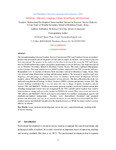Teachers’ Professional Development Issues and their Impact on Teachers’ Service Delivery. A Case Study of Msimba Secondary School in Mombasa County, Kenya
Abstract
The misunderstanding between Teachers Service Commission (TSC) and Teachers Unions on teachers’ professional assessment and development (TPAD) and its impact on teachers’ service delivery has not been investigated. The purpose of the study was therefore to document the issues the TSC and Unions have on TPAD and how they impact on teachers’ performance in service delivery. The study was carried out at ‘Msimba’ Secondary School in Mombasa County, Kenya. The study employed ethnographic research design. The target population was 324000 teachers employed by the TSC in schools in Kenya. Respondents were 43 teachers at Msimba Girls Secondary schools in Mombasa County, Kenya. Data was collected using observation, probing and document analysis. The descriptive statistics used were frequency and percentage to compare the issues on teachers’ professional development between teachers’ union, TSC and their effect on teachers’ service delivery. The data collected in this study was analysed using Statistical Package for Social Sciences (SPSS) computer programme version 20.0. The research findings established that it was not clear who was in charge of quality standard in schools between TSC and MoES&T; TPAD was not used to promote teachers; certificate teachers earned after attending management courses were not recognised by the TSC; and that junior teachers were used by head teachers to manage and rate senior teachers on TPAD in the school. There was a silent war between TSC officers and MoES&T officers in trying to win control over teachers’ management, quality and standards and students’ management. Teachers were demoralised, frustrated and prepared professional documents that they never used in classroom. It was therefore recommended that TSC, teachers unions and MoES&T should solve the identified issues on TPAD for better teacher’s service delivery in schools

